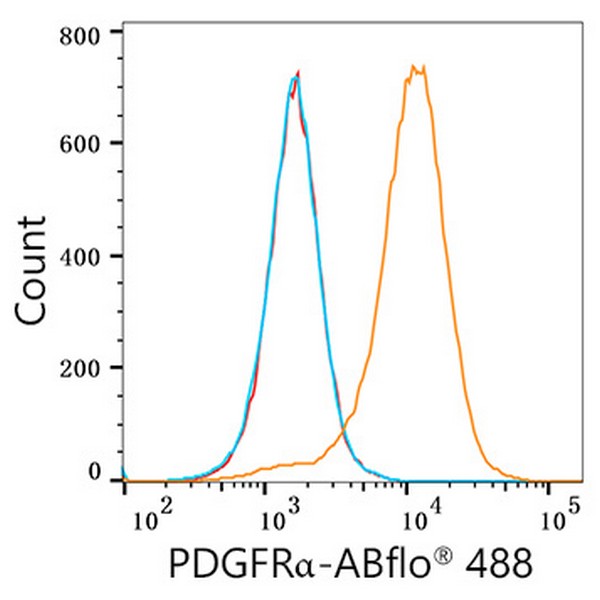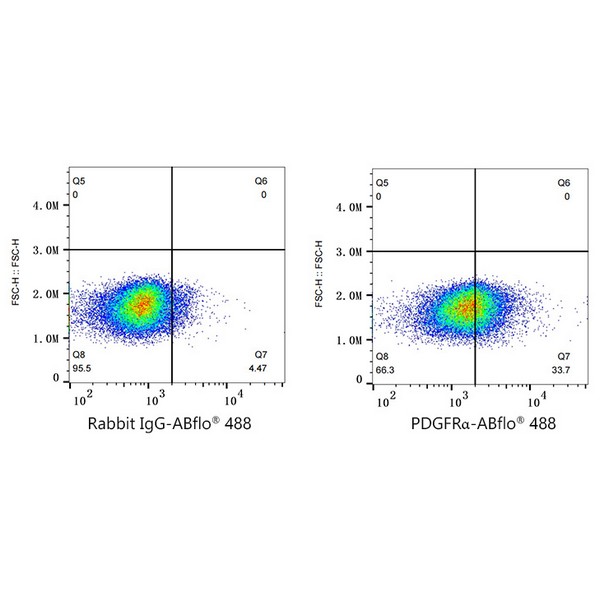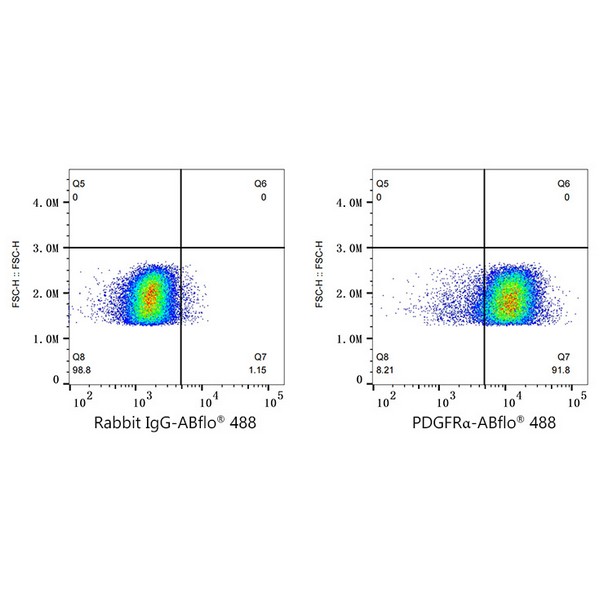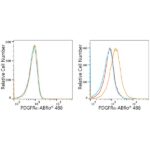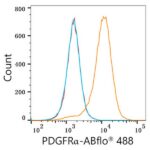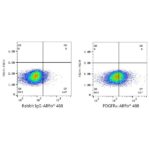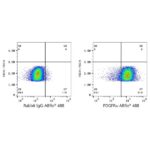ABflo® 488 Rabbit anti-Human/Mouse PDGFRα/CD140a mAb (A22689)
$290.00 – $768.00
Abclonal ABflo® 488 Rabbit anti-Human/Mouse PDGFRα/CD140a mAb (Catalog Number: A22689) encodes a cell surface tyrosine kinase receptor for members of the platelet-derived growth factor family. These growth factors are mitogens for cells of mesenchymal origin.
- Product Details
- Description
- Additional information
- More Offers
| Catalog No. | A22689 |
|---|---|
| Product Name | ABflo® 488 Rabbit anti-Human/Mouse PDGFRα/CD140a mAb (A22689) |
| Supplier Name | ABclonal, Inc. |
| Brand Name | Abclonal |
| Synonyms | CD140A; PDGFR2; PDGFR-2 |
| Gene Name | PDGFRA |
| Protein Name | PDGFRA |
| Uniprot/Swissprot ID | P16234 |
| Entrez GeneID | 5156 |
| Clonality | Monoclonal |
| Source/Host | Rabbit |
| Applications | FC |
| Reactivity | Mouse |
| Conjugate | ABflo® 488. Ex:491nm. Em:516nm. |
| Note | Products will be shipped from the warehouse in Massachusetts. Promotion is running from time to time. Welcome to send a request for quote to message@sydlabs.com. |
| Order Offline | Syd Labs, Inc. 4 Avenue E, Hopkinton, MA 01748 USA. Phone: 1-617-401-8149 Fax: 1-617-606-5019 Email: message@sydlabs.com |
Description
A22689: ABflo® 488 Rabbit anti-Human/Mouse PDGFRα/CD140a mAb
This gene encodes a cell surface tyrosine kinase receptor for members of the platelet-derived growth factor family. These growth factors are mitogens for cells of mesenchymal origin. The identity of the growth factor bound to a receptor monomer determines whether the functional receptor is a homodimer or a heterodimer, composed of both platelet-derived growth factor receptor alpha and beta polypeptides. Studies suggest that this gene plays a role in organ development, wound healing, and tumor progression. Mutations in this gene have been associated with idiopathic hypereosinophilic syndrome, somatic and familial gastrointestinal stromal tumors, and a variety of other cancers.
Immunogen Information about ABflo® 488 Rabbit anti-Human/Mouse PDGFRα/CD140a mAb (A22689)
Immunogen:Recombinant fusion protein containing a sequence corresponding to amino acids 24-524 of human PDGFRα (NP_006197.1).
Sequence:QLSLPSILPNENEKVVQLNSSFSLRCFGESEVSWQYPMSEEESSDVEIRNEENNSGLFVTVLEVSSASAAHTGLYTCYYNHTQTEENELEGRHIYIYVPDPDVAFVPLGMTDYLVIVEDDDSAIIPCRTTDPETPVTLHNSEGVVPASYDSRQGFNGTFTVGPYICEATVKGKKFQTIPFNVYALKATSELDLEMEALKTVYKSGETIVVTCAVFNNEVVDLQWTYPGEVKGKGITMLEEIKVPSIKLVYTLTVPEATVKDSGDYECAARQATREVKEMKKVTISVHEKGFIEIKPTFSQLEAVNLHEVKHFVVEVRAYPPPRISWLKNNLTLIENLTEITTDVEKIQEIRYRSKLKLIRAKEEDSGHYTIVAQNEDAVKSYTFELLTQVPSSILDLVDDHHGSTGGQTVRCTAEGTPLPDIEWMICKDIKKCNNETSWTILANNVSNIITEIHSRDRSTVEGRVTFAKVEETIAVRCLAKNLLGAENRELKLVAPTLRSE
Gene ID:5156
Swiss prot:P16234
Synonyms:CD140A; PDGFR2; PDGFR-2
Calculated MW:24kDa/82kDa/123kDa
Observed MW:Refer to figures
Images of ABflo® 488 Rabbit anti-Human/Mouse PDGFRα/CD140a mAb (A22689)

Flow cytometry:1X10^6 HeLa cells (negative control, Left) and U-138 MG cells (Right) were surface-stained with ABflo® 488 Rabbit anti-Mouse PDGFRα/CD140a mAb (A22689, 5 μl/Test, orange line) or ABflo® 488 Rabbit IgG isotype control (A22069, 5 μl/Test, blue line). Non-fluorescently stained cells were used as blank control (red line).

Flow cytometry: 1X10^6 NIH/3T3 cells were surface-stained with ABflo® 488 Rabbit anti-Mouse PDGFRα/CD140a mAb (A22689, 5 μl/Test, orange line) or ABflo® 488 Rabbit IgG isotype control (A22069, 5 μl/Test, blue line).Non-fluorescently stained NIH/3T3 cells were used as blank control (red line).

Flow cytometry:1X10^6 U-138 MG cells were surface-stained with ABflo™ 488 Rabbit IgG isotype control (A22069, 5 μl/Test, left) or ABflo™ 488 Rabbit anti-Human/Mouse PDGFRα/CD140a mAb (A22689, 5 μl/Test, right).

Flow cytometry:1X10^6 NIH/3T3 cells were surface-stained with ABflo® 488 Rabbit IgG isotype control (A22069, 5 μl/Test, left) or ABflo® 488 Rabbit anti-Mouse PDGFRα/CD140a mAb (A22689, 5 μl/Test, right).
Please remember our product information: ABflo® 488 Rabbit anti-Human/Mouse PDGFRα/CD140a mAb (Catalog Number: A22689) Abclonal
Additional information
| Ship from Country | USA |
|---|---|
| Size | 100 μg, 25 μg, 50 μg |

